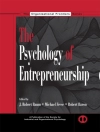Disciplinary psychology has failed to achieve a coherent conception of human agency. Instead, it oscillates between two differing conceptions of agency that are equally untenable: a scientistic, reductive approach to choice and action, and an instrumental approach that celebrates a romantic notion of free will. This book examines theoretical, philosophical psychology and argues for a historically and socioculturally situated human capacity for choosing and acting in ways not entirely determined by culture and/or biology. The authors present a detailed developmental theory of how agentic capability emerges from the pre-reflective activity of humans in a real physical and social world. Implications of the theory are considered for psychological research and practice, and for the broader socio-political impact of disciplinary psychology in Western liberal democracies.
Cuprins
Preface
1. PSYCHOLOGY AND THE QUESTION OF AGENCY
Some Relevant Background for What Follows
Psychology’s Disavowal of Agency
The Basic Error
Method over Substance
Aspirations
2. REDUCTIONISM IN PSYCHOLOGY
A Historical Sketch
Identity versus Requirement
Omissions
Summary and Implications
Research Practices and the Construction of Pseudo-Psychological Kinds
Causal Woes
Variability and Its Statistical Treatment
Manufacturing and Generalizing Psychological Entities
The Role of Professional Psychology
The Example of Self-Concept
Another Kind of Reductionism in Psychology
An Antidote in Brief
3. BETWEEN HARD DETERMINISM AND RADICAL FREEDOM
Definitions and Distinctions
A Critical Consideration of Some Notable Attempts at Soft Determinism
Philosophical Considerations
Psychological Considerations
Bandura’s Social Cognitive Theory
Theory of Mind and Intentional Self-Development
Theoretical Psychology of Agency
Hermeneutics and Agency
4. THE UNDERDETERMINATION AND IRREDUCIBILITYOF AGENCY
An Argument for the Underdetermination of Agency
Structure of the Argument
Against Full Physical-Biological
Determinism
Against Full Sociocultural Determinism
Against Randomness and Unconscious Processes Alone
Agency as the Surviving, Plausible Option
Contemporary Programs of Reductionism and the Irreducibility of Agency
Central State Materialism
Supervenience and Functionalism
Computational Models of Mind
What Is Missing in Reductive Functionalism and Computationalism?
Summary and Links
5. A THEORY OF SITUATED, EMERGENT, AND DELIBERATIVE AGENCY
Levels of Reality
Being-in-the-World
Tiered Reality
An Existential Starting Point and a Brief Conception of Personhood
The Developmental Emergence of Situated, Deliberative Agency and Psychological Kinds
Understanding and Care within Traditions of Living
Summarizing Our Theory of Agency and Psychological Kinds
Implications for Understanding Psychological Phenomena
A Final Word
6. PUTTING AGENCY INTO PSYCHOLOGY
Re-envisioning Psychological Research: Reinforcement Theory and Beyond
Reinforcement Theory Revisited
Beyond Reinforcement Theory
Re-envisioning Psychological Practice
The Nature of Psychotherapy
The Practice of Psychotherapy
The Education of Psychotherapists
The Sociopolitical Consequences of Situated, Emergent, and Deliberative Agency
Liberalism and Communitarianism
The Political Disposition of a Situated, Emergent, and Deliberative Agency
A Concluding Comment
References
Index
Despre autor
Jack Martin is the Burnaby Mountain Endowed Professor of Education at Simon Fraser University. He is the coeditor (with Lisa Tsoi Hoshmand) of
Research as Praxis: Lessons From Programmatic Research in Therapeutic Psychology, and the author of several books including (with Jeff Sugarman)
The Psychology of Human Possibility and Constraint, published by SUNY Press.
Jeff Sugarman is Assistant Professor of Education and
Janice Thompson is Associate Dean of Education at Simon Fraser University.












